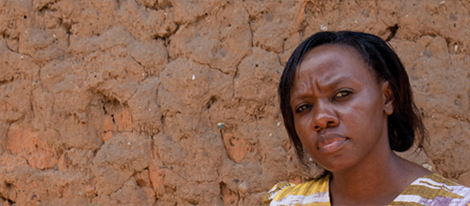
Phyllis Omido
Last week, Phyllis Omido, a community organizer in Mombasa, Kenya, received the Africa 2015 Goldman Environmental Prize for her work inciting justice. Phyllis Omido has been combating toxicity in all its forms: chemical, environmental, cultural, political, economic. She has struggled and organized to transform sites of toxic elements into spaces of collective health and well-being.
In 2009, an iron-smelting factory opened in the densely populated Owino Uhuru slum of Mombasa. Solar energy is big in Kenya, and growing quickly. To meet the increased demand for lead coming from the solar industry, smelting factories have popped up, recycling car batteries in smelters. It’s big business.
The smelting factory in Mombasa hired Phyllis Omido as a community liaison officer. Her job included conducting an environmental impact study. Somehow, despite all sorts of regulations, they had opened without any such study. Meanwhile, Omido’s two-and-a-half year old child began suffering a series of ailments: nausea, sleeplessness, high fever, and more. Tests finally showed that Omido’s son, King David, was suffering from lead poisoning, which he’d contracted from his mother’s breast milk.
Omido took her environmental impact study to her bosses, who immediately shut it down. She took it to the State, who immediately accused her of being a member of the opposition. They argued that she was clearly out to destroy the economy and crush the hopes of poor working people and communities. Omido had a long history of conducting professional environmental impact studies for other factories, and yet her hard data made less than no difference.
At first, Phyllis Omido campaigned for the factory to pay for her son’s medical care, which they did, once she agreed to sign non-disclosure agreements. But Phyllis Omido looked around and knew she couldn’t keep quiet. Too many lives were at stake.
And so Phyllis Omido organized. She organized a campaign to shut down the factory. After five years, that happened last year … sort of. When Phyllis Omido protested peacefully, she was charged with inciting violence. She was acquitted. When Phyllis Omido was physically and otherwise attacked, her response was to turn swords into ploughshares. She intensified and broadened the campaign. She founded The Center for Justice Governance & Environmental Action. She started taking on salt miners who are damaging Kenya’s coastal fisheries. She is testing the soil and air in a variety of nearby slum neighborhoods, and demanding action. She is suing the Kenyan government and its environmental agency, demanding that they pay compensation, clean up the local environment, and abide by the Constitutional mandate to provide a clean and safe environment for all.
Phyllis Omido has fused anecdotal, experiential evidence with hard, scientific data and created a powerful tool for the people, and especially the women, of the slums of Mombasa and beyond. She pursued what she could see. For example, on entering the plant, foreign managers donned protective gear and masks, but “the workers just worked. Sometimes they’d take a piece of rag and tie it around their noses but they didn’t have any protective gear. At that point when I was still there, they didn’t know that this [air] was poisonous. They were just protecting themselves from the smoke, the acid, the stench.” She pursued what she could not see: the paths of toxic elements, the lead contaminating the air, water, soil; the greed contaminating the State.
In January 2015, the State finally started testing the children of the slums of Mombasa. Thanks to Phyllis Omido and countless women slum dwellers like her, the quest for justice continues.
(Photo Credit: The Goldman Environmental Prize)